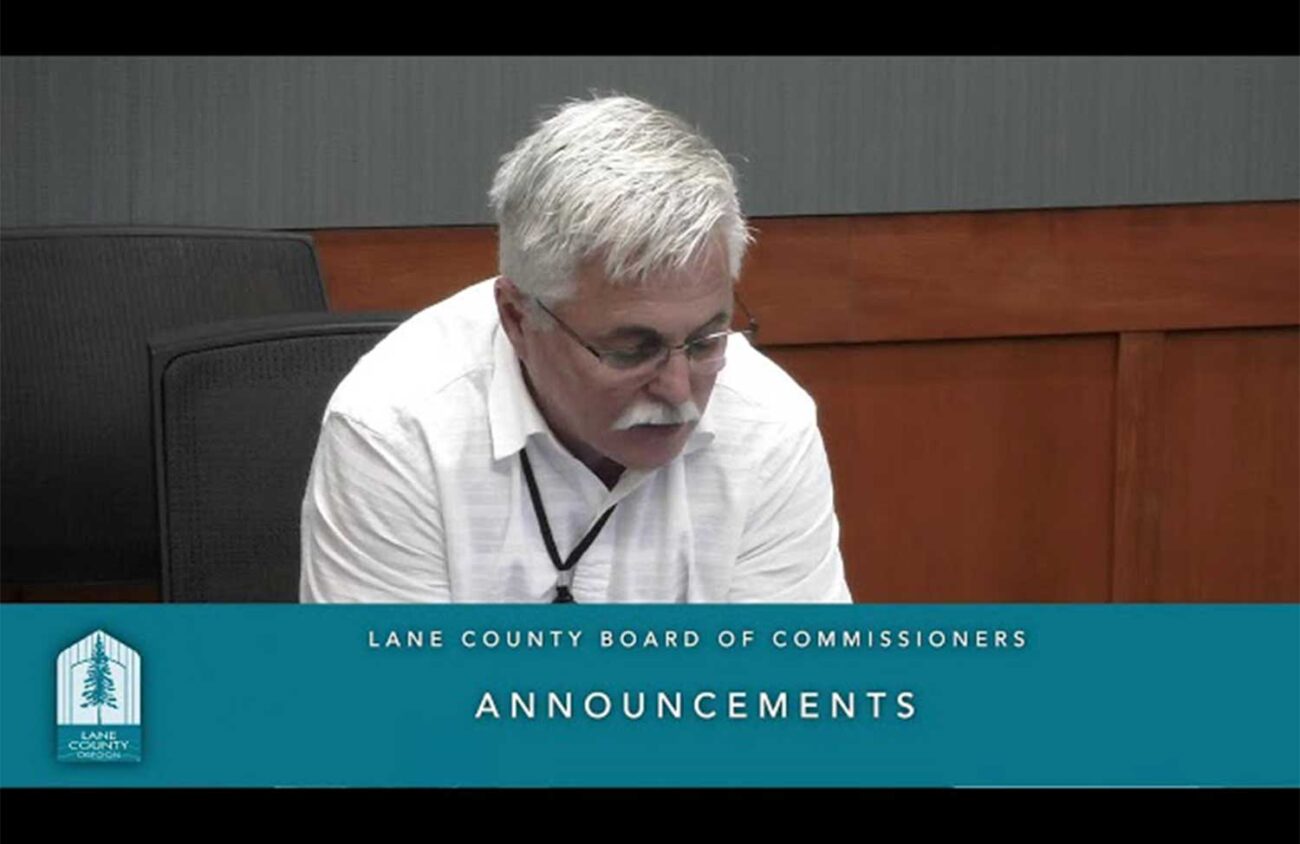During his seventh meeting as board chair on Jan. 28, Lane County Commissioner David Loveall opened the session by saying, “Robert’s Rule of Order protocol is ‘God before country.’ I’d like to say that my late son changed his name at an orphanage in Africa, a handful of years before we adopted him, to Biyinzika, which means: with God, all things are possible.”
It was one of several meetings where Loveall used language consistent with Christian ideology and prayer. Loveall and his wife, Nita Loveall, are the founders of Three Sixteen Ministries International, a Christian nonprofit that builds churches and other infrastructure projects in Uganda.
Loveall continued, adding, “It’s been said recently that what our nation does is the impossible, so I declare this blessing today that we do both the possible and impossible for those that we serve in my community.” Previous editions of Robert’s Rules of Order, first published in 1876, established that an invocation to deity at a meeting should come before the Pledge of Allegiance — “God before country.”
Robert’s Rules of Order does not say that there is a requirement for an invocation, but if one is to take place — it should be before business begins.
Loveall finished his Jan. 28 introductory statement with a “flag tribute” in which he dedicates the flag to “Our great citizens of our county, the staff, the countless volunteers and community partners who are servants of the important and often the impossible as well.”
This came almost two weeks after Loveall called upon his fellow commissioners to make “kingdom decisions.” Kingdom decisions is a term used sometimes within Christian faiths referring to the Kingdom of God.
The invocations were first pointed out by Cottage Grove’s Blackberry Pie Society, a political action nonprofit, and by Land Watch Lane County, a land use advocacy group.
At the Jan. 28 meeting, Commissioner Heather Buch criticized Loveall’s introductions saying, “Our chair continues to reference his God and a blessing at the beginning of meetings, which I find disturbing and unsettling.” She added, “We are here to do the business of the county.” She emphasized that Loveall’s comments are not reflective of all of the commissioners’ beliefs and are not on behalf of the entire board.
Loveall responded, “I want to remind my colleague that freedom of speech goes with everyone.” He later responded to a public commenter, Amanda Nobel Flannery, who criticized Loveall’s invocation because President Donald Trump had recently said a similar phrase. Loveall said, “I would remind you that Luke 18:7 says, ‘The things that are impossible with men are possible with God.’ This nation was founded on a principle of Christian foundation.” The actual number appears to be 18:27.
Loveall has since faced further criticism by community members such as House District 12 Chair of the Lane County Democratic Party, Ron Shaheen. “We’re supposed to be a secular nation, we’re supposed to believe that the government is not supposed to favor one religion or the other,” he says to Eugene Weekly.
After receiving pushback from Buch and community members, Loveall changed his introductions to focus more on topics like the U.S. flag and tie its symbolism into narratives of patriotism, good deeds and sometimes God. However, critics say this is an end-run around directly mentioning Christian prayer.
Most recently, Loveall has been focusing on the 13 folds used to fold the U.S. flag into a triangle during ceremonies such as a funeral. Each fold, according to some sources, represents a symbolic meaning relating to life, god and the nation. This interpretation is not officially recognized by the U.S. government. Instead, it is an unofficial interpretation adopted by the National Flag Foundation and other private organizations.
In a July 29 morning meeting, Loveall said, “Fold 10 pays tribute to father, for he, too, has given sons and daughters for the defense of our country, and fold 11 in the eyes of the Hebrew citizens represents the lower portion of the seal of King David and King Solomon and glorified in their eyes the God of Abraham, Isaac and Jacob.”
In an email to Eugene Weekly, Loveall writes, “We live in an emotionally charged season where weaponization of words or differing beliefs are used to create click bait and anger to establish a position rather than a dialogue.” Adding that his invocations “are not blatantly religious or necessarily Christian, but rather general inspirational stories and thoughts to our country’s heroes, leaders and edicts of how our flag came to mean what it symbolizes.”
Loveall writes that his invocations have not violated the establishment clause, which establishes the separation of church and state. He claims he is using invocations to honor veterans, first responders and “provoke solemn thought to the passing of those who made significant marks in our country’s making.”
But critics say Loveall’s actions are part of a larger movement in the U.S. to incorporate Christian values into the government. “This is a very specific type of very specific set of beliefs that they’re trying to impose on the nation and on the county,” Shaheen says.
